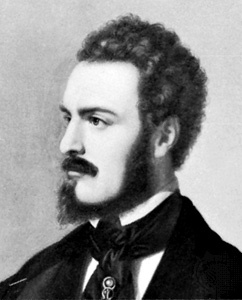Giusti, Giuseppe
Italian author
born May 13, 1809, Monsummano, Tuscany
died March 31, 1850, Florence
 northern Italian poet and satirist, whose satires on Austrian rule during the early years of Italy's nationalistic movement (the Risorgimento) had great influence and are still enjoyed for their Tuscan wit and lively style.
northern Italian poet and satirist, whose satires on Austrian rule during the early years of Italy's nationalistic movement (the Risorgimento) had great influence and are still enjoyed for their Tuscan wit and lively style.Giusti was sporadically a law student in Pisa (1826–29 and 1832–34) and led an inconspicuous life until the Revolution of 1848. He then sat as a deputy in the two Tuscan legislative assemblies and in the short-lived constituent assembly (until April 1849).
Giusti's satirical poems were at first circulated only in manuscript; the first collections of them had to be printed outside Italy without the author's name. His first notable satire, written in 1833, was La guigliottina a vapore (“The Steam Guillotine”), which announced that the Chinese had invented a steam guillotine that would make decapitation much more efficient for dictators. Other satires defended Italy or bemoaned its political and social state.
Giusti also wrote satires on the death (1835) of the Austrian emperor Francis I and on the crowning of the new emperor. A very moving poem, often considered his masterpiece, is Sant'Ambrogio (c. 1846), in which the poet's hostility toward Austrian troops attending a mass turns into a feeling of sympathy and solidarity with them as they join in singing a chorus by Giuseppe Verdi.
Giusti's prose works are valued for his skillful use of the Tuscan tongue. Some poetic works were translated by William Dean Howells in Modern Italian Poets (1887).
- avidyā
- Avignon
- Avignon papacy
- Avignon school
- avijjā
- Avilés
- Avinu Malkenu
- avionics
- Avison, Charles
- Avison, Margaret
- Avitus
- avocado
- avocet
- Avogadro, Amedeo
- Avogadro's law
- Avogadro's number
- avoidance behaviour
- avoidance relationship
- avoidance, zone of
- avoirdupois weight
- Avola
- Avon
- Avondale
- Avon, River
- Avram Hershko